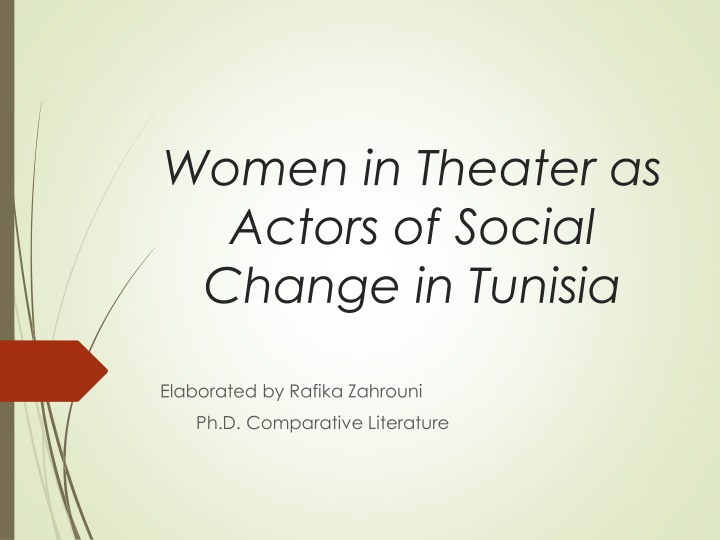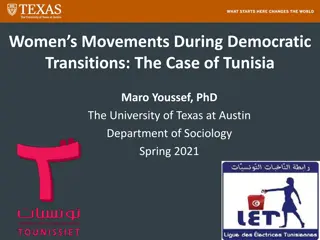Women in Theater as Agents of Social Change in Tunisia: An Analysis
Analyzing the pivotal role of women in theater and their impact on social progress in Tunisia, focusing on notable figures like Jalila Baccar and Fatma ben Saidane. Explore their collaboration with director Fadhel Jabi and their resistance against gender norms through theater.
Download Presentation

Please find below an Image/Link to download the presentation.
The content on the website is provided AS IS for your information and personal use only. It may not be sold, licensed, or shared on other websites without obtaining consent from the author.If you encounter any issues during the download, it is possible that the publisher has removed the file from their server.
You are allowed to download the files provided on this website for personal or commercial use, subject to the condition that they are used lawfully. All files are the property of their respective owners.
The content on the website is provided AS IS for your information and personal use only. It may not be sold, licensed, or shared on other websites without obtaining consent from the author.
E N D
Presentation Transcript
Women in Theater as Actors of Social Change in Tunisia Elaborated by Rafika Zahrouni Ph.D. Comparative Literature
Main argument The main aim of this paper is to analyze and discuss the importance of women in theater and their contribution to social change and progress since many decades before the 2011 revolution
The notion of Progress Piotr Sztompka proposed ; it is about achieving and striving rather than achievement and attainment Social change becomes a quest to use Sztompka s term
The main two theater practitioners Jalila Baccar and Fatma ben Saidane Common to both actresses is the fact that they are figures of resistance designed to change gendered roles Both worked with theater director Fadhel Ja bi, an instrumental figure in contemporary Tunisian theater not only as a director but also as a dramatist and co-writer with his troupe.
Fadhel Jabi (1945-) Fadhel Ja bi, a man that has been able to keep alive the values of freedom of expression and criticism of power, even in difficult times for Tunisia. Since 1980, this theater director has become widely known in the Arab world and over the few last decades in many countries in the West
Jalila Baccar Born in 1952- She performed in over plays She studied French Literature, but dropped out of The Ecole Normale Superieure Joined the Theater of the South in 1973 She founded Familia Productions with her husband Fadhel Ja bi in 1994 and performed in almost all Familia Productions plays.
Fatma ben Saidane Was born in 1949- She is an actress She studied at the Higher Institute of Dramatic Arts of Tunis She also studied in the Theater Institute of Tania Balachova in Paris In 1984, she was trained in mime under the supervision of Laura Sheppard in Boston She played in plays such as Arab, El Awada, Com dia, Familia, Junun, Khamsoun, Tsunami, etc.
Staging social and political issues key actresses: Jalila Baccar and Fatma ben Saidane Key performances: Fam lia (Family, 2001) Gassalet Ennouader (The First Real Rain of the Fall, 1980) Al-Ba th an Ayda (Searching for Aida, 1998) Jun n (Dementia, 2001).
Gassalet Ennouader (The First Real Rain of the Fall, 1980) The protagonist Beya embodies the voice of change at many levels: On a personal level, she leaves the family home to live on her own On a professional level, she directs criticism to the newspapers printing press, which is in need for radical change Beya s tone of resistance also impacts Laroussi s life
Al- Bath an Ayda (1998) Al- Ba th an Ayda the role of Baccar is key to understand that her position as actress and playwright is to impact political change in a context that is larger than the Tunisian society
Al- Bath an Ayda as a monodrama of resistance in the hope to create new possibilities Seeking Ayda frames the interconnectedness between the personal and the national story of Ayda /Palestine The drama is structured based on a double absence: the absence of Ayda reflects an imagined Palestine, as characterized by the the speaker in the play a Palestine that is gone but will one day return as the name Ayda literally means coming back.
How is the call for political change addressed on stage? The use of monologue is meant to sensitize Baccar s audience to human rights, evoking emotions of pity and sadness through the story of Ayda who was obligated to travel from one town to another inside Palestine and later to Amman, and then to Beirut as a refugee.
The personal story of Ayda: a tool to reinterpret the story of Palestine In this monodrama, Baccar seems to represent the political conscience of the Arab nation through reconstructing imaginary bonds with Palestine. A collective memory is created by Baccar in the hope of reconstructing a new reality of Palestine through the story of Ayda
Famlia (Family, 2001) Synopsis In this play Molka (Sabeh Bouzouita), Bahja (Jalila Baccar) and Babouna (Fatma ben Saidane) break down all aspects of the hegemonic constructions of the male character, sayra (Kamel Touati). These female figures resisted against the only male character in the play, subverting his role and excluded him from their lives when they figured out he is a threat to their existence.
Famlia aims at making political change a possibility Baccar s political conscience sensitizes her audiences to the people-State conflicts. Fam lia purports to depict the state of old age that is at the heart of this play to infer the senescence of an entire society in decay.
It is the criticism directed to this decay that marks how female Tunisian actresses Baccar and Ben Saidane played confrontational roles designed to change the traditional manner of looking at women from the angle of sexual objectification.
Junn (Dementia, 2001) Synopsis The woman doctor s act of protest against all her co-workers in the asylum, symbolically, aims to critique the asylum as an institution that is in regress and, thus, in need of reform. The socio-cultural and political messages in this play are communicated mainly through the role played by Nun but also through the role of female actresses Baccar and Ben Saidane.
Performing the mother role breaks silence on damaged family relationships, particularly mother-son bonds The death of the mother in the final scene is symbolic in the sense that it represents a warning of an imminent social chaos.
Conclusion The roles played by Baccar and Ben Saidane demonstrate how performing gender teaches us about the complexity of socio-economic issues in Tunisia without falling in the trap of performing merely stereotypical patriarchal oppression.
By underscoring old age in Famlia, media oppression in Gassalet Ennouader, the Palestinian-Israeli conflict in al- Ba th an Ayda, and the psychiatric institution as well as motherhood in Jun n , the roles played by Baccar and Ben Saidane challenge narrow views of femininity to touch on several forms of oppression. It is through these roles that they impact their audience and bring about social change.























